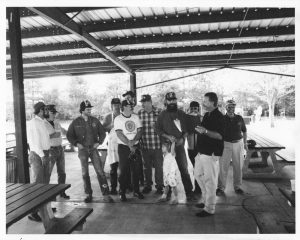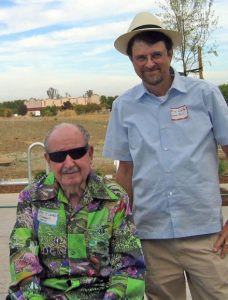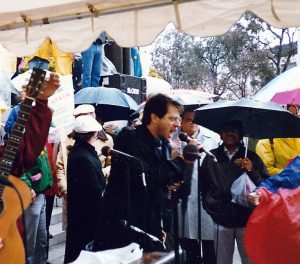I was hired as communications director in 1990. I knew nothing about Local 1245. Business Manager Jack McNally told me that the union’s founding fathers would be in town for the union’s 50th anniversary in 1991 and that I should interview them. My Local 1245 education was about to begin.
Ron Weakley and L. L. Mitchell, our founders, learned the facts of life during the Great Depression. They wondered how workers could survive that economic catastrophe. Some people today consider government a dirty word, but Weakley and Mitchell saw government as an important tool. They saw how laws like the National Labor Relations Act had expanded workers’ rights and made it possible to organize effective unions. Don Hardie, another one of the early organizers and a good friend of Weakley’s, once put it this way:
“Nothing’s perfect. I don’t think corporations are perfect and I don’t think unions are perfect. I don’t think the government is perfect, but if they’re going to work for you, you’ve got to organize them.”

The victory party celebrating the successful conclusion of the 1992 Asplundh strike. From left: Landis Marttila, Rich Hafner, Eric Wolfe, Mickey Harrington, Jack Osburn, (behind is probably Phil Carter), Orv Owen, strike leader Dean Gurke and child, Ed Fortier, rank-and-file strike leader Jim Travis, and Joe Valentino.
The Asplundh Strike of 1992 showed me what unionism was really all about, not just the theory but the blood and bones of it. The first day of the strike I watched a scab use his truck to nearly run over Joe Valentino, who was picketing with me before dawn. We followed that truck into the countryside around Chico. The truck turned onto a private drive that cut through a field to some trees about 50 yards away. We couldn’t go onto private property. Joe said he needed to gas up the old white van we were traveling in. He left me there standing by that field with a picket sign in my hand, alone in the middle of nowhere. It was really quiet, just me and the chirping birds. I felt like Cary Grant in that scene from “North by Northwest” where he’s standing alone by a field and then a crop duster suddenly appears and starts chasing him through the corn. I was nervous, but I knew there were dozens of other guys scattered across several counties putting themselves in similar situations and that gave me courage.
McNally made a risky call, pushing tree trimmers to approve that strike. But it paid off. The strike was an unqualified victory.
We had another war on our hands in 1994, when California launched electric deregulation. Enron was the pied piper of deregulation and California followed those Enron crooks right off the cliff. It was wreaking havoc on our members, endangering thousands of jobs. McNally called for a big rally at the CPUC in December of 1994, which I helped organize. It was raining like a son-of-a-bitch but Landis Marttila had wrapped all of our picket signs in plastic so they wouldn’t disintegrate.
CPUC security had told me we had to keep a clear pathway down the middle of the broad steps in front of the building. But we ended up having a thousand people there. I wasn’t about to tell a bunch of wet, angry, shouting linemen facing layoffs that they had to keep a path clear. The cops decided we weren’t doing any harm and that maybe a path wasn’t necessary after all. I learned this: sometimes you just have to do what you have to do, and if there are enough of you then you’ll carry the day.
We were on just about every news channel in the state that night. I thought: “I have a really great job.”
McNally liked that rally so much he decided we needed another one in 1999. Deregulation was squeezing PG&E financially and we were concerned about the impact on service and, of course, jobs. On the Friday before Thanksgiving week, McNally called Landis and me into his office and said he wanted this new rally to take place on the Monday after Thanksgiving. We needed hundreds of people there, he reminded us. And banners and picket signs and speakers and a sound system and permits and publicity and the news media. We had exactly three work-days during Thanksgiving week to put it together. Business managers can be like that.
For me, this union entered a new era when Tom Dalzell put new emphasis on organizing and mobilizing. In truth, we had little choice. Unions have been under sustained attack, and the utility industry had been undergoing convulsive changes ever since the deregulation fiasco. NV Energy, as some will recall, really put us to the test in 2009 when it tried to gut retiree medical benefits. This union could not let that happen, and we were fortunate to have some kick-ass retirees in Nevada ready to lead the charge.
New and greater challenges surely lurk on the road ahead. Justice for workers isn’t a battle you win or lose; that battle is just a condition of life. You don’t get respect on the job, equal opportunity, or your fair share of the economic pie just because you deserve it. You get it when you’re willing to fight for it, get whipped, and then get back up and fight some more.
This union has a long tradition of being led by fighters. But leaders don’t make a union. You do: the members of IBEW 1245. Weakley and Mitchell and a lot of members whose names we won’t ever know went to a lot of trouble to get us all this far. It was my privilege and joy to be with many of you when we took a few steps further down that road.
Eric Wolfe has been communications director of IBEW 1245 for 26 years. He will retire on September 9.

